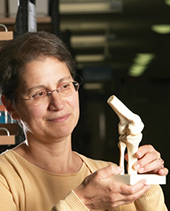Skip to content. | Skip to navigation
Personal tools

- Contact Us |
- Seminars |
- Donate

Mount Sinai Hospital
Joseph & Wolf Lebovic Health Complex
5-1013 25 Orde St.
Toronto, Ontario
M5T 3L9
Tel.: 416-586-4800 ext.8516
Fax: 416-586-5993
► Web of Science Researcher ID
E-2149-2017
Dr. Rita Kandel
SENIOR CLINICIAN SCIENTIST
Dr. Rita Kandel is Chief of Pathology and Laboratory Medicine at Mount Sinai Hospital, and leads a staff of over 200 professionals who make up the Department.
At Mount Sinai Hospital, our Pathology and Laboratory Medicine team is moving towards molecular diagnostics, which measures a patient's DNA, RNA, or proteins to diagnose a disease, or a predisposition to a disease, like breast cancer for example, or suggest a treatment. Mount Sinai's implementation of this type of diagnostic approach positions the Hospital at the forefront of the emerging field of personalized medicine. Personalized medicine will allow a patient to receive the appropriate treatment at the right time for that individual.
Dr. Kandel is also a clinician-scientist and Associate Member of the Lunenfeld-Tanenbaum Research Institute. Her research pursuits follow two investigative paths. First, Dr. Kandel is working towards identifying biomarkers (a protein that can indicate a particular biological condition) associated with bone and soft tissue tumours (sarcomas). Dr. Kandel collaborates closely with Mount Sinai Hospital's clinical Sarcoma Unit, the largest of its kind in Canada, ensuring that the scientific questions being pursued are closely aligned with patient care needs. By identifying the biomarkers unique to these tumours, doctors will be able to diagnose the cancer at an earlier stage, resulting in better outcomes for patients.
The regeneration of musculoskeletal (bone and soft) tissue is Dr. Kandel's second research focus. Specifically, Dr. Kandel's lab is attempting to build new tissues to replace human joints that are damaged by injury or disease. In fact, Dr. Kandel is confident that by incorporating and developing new principles and techniques of regenerative medicine, her lab will be able to build a replacement joint made from biological materials in approximately five years. This means that a joint will no longer be replaced with a plastic or metal replica, but with one built from a patient's own tissue and cells.
Dr. Kandel is also a professor at the University of Toronto, cross-appointed to the Department of Surgery and Institute of Biomaterials and Biomedical Engineering, and is the Head of the Bioengineering of Skeletal Tissues Team, which consists of a multidisciplinary group of investigators, including engineers, biologists, stem cell biologists, and clinicians whose work focuses on regenerative medicine.
At a Glance
Dr. Kandel is working towards identifying biomarkers associated with bone and soft tissue tumours (sarcomas).
By identifying the biomarkers unique to these tumours, doctors will be able to diagnose the cancer at an earlier stage, resulting in better outcomes for patients.
The regeneration of musculoskeletal (bone and soft) tissue is Dr. Kandel's second research focus. Specifically, Dr. Kandel's lab is attempting to build new tissues to replace human joints that are damaged by injury or disease.
Major Research Activities
Dr. Kandel's lab is attempting to build new tissues to replace human joints that are damaged by injury or disease. This means that a joint will no longer be replaced with a plastic or metal replica, but with one built from a patient's own tissue and cells.



